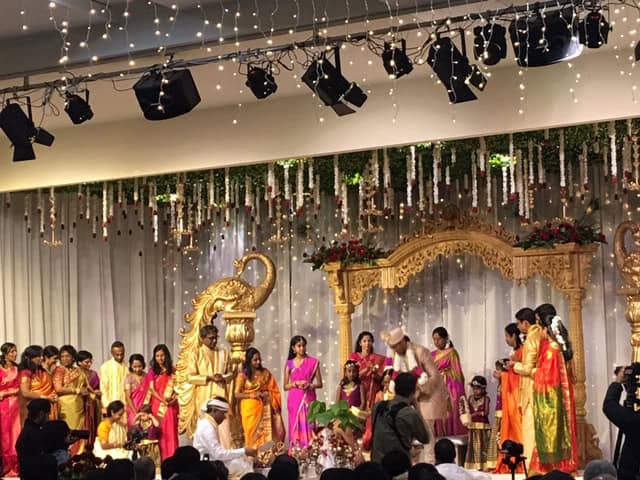I quite like having to remove my shoes at a wedding. When you are in menopause or post-menopause it’s very cooling. Did you know that we have hundreds of nerve endings and tiny blood vessels in the soles of our feet that are part of our ancient cooling mechanism? It’s the same with the palms of our hands and when we are ‘hot and bothered’ during menopause, our cooling mechanism kicks in when we allow these regions to be exposed and in the context of our feet, also staying in touch with the earth. Looking at the bride’s beautiful henna-endowed hands reminded me how important our hands and feet are in controlling our body’s cooling mechanisms. I loved her hands – covered with henna, they added to her grace and composure as she moved them through the numerous Hindu wedding rituals.
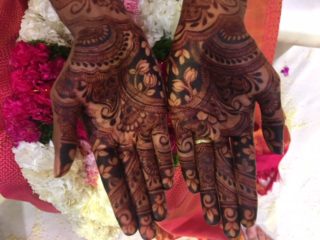
Taking my shoes off at the temple door to show respect for the Hindu culture, fitted perfectly in with my mid-life circadian rhythm. It is well known by chrono-biologists [people who study Circadian Rhythm], that our temperature regulation is also on a day/night cycle. And it’s why so many women going into and through menopause feel hot and bothered between the hour so 4-7pm. It’s when our body is primed for heat and it’s all part of our day/ night circadian rhythm.
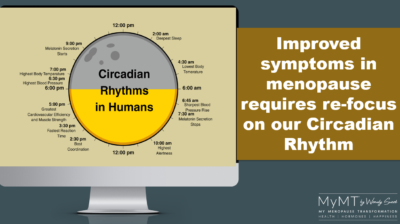
The Sri Lankan Hindu wedding I attended yesterday was a wonderful, colourful celebration of love infused with ancient culture and traditions. My daughter loved dressing for the occasion. 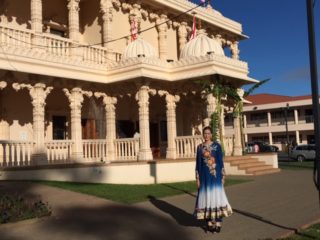 The brides family were our friends. The bride’s father was bought up in Sri Lanka and for him especially, the wedding and seeing his beautiful daughter so happy, was a welcome break from grief coming out of his home-country over the past week. Being surrounded by love not hate, is healing. The priest chanted his way through the 3+hour-long ceremony and the young bridal couple sat with dignity and reverence for their culture despite living their modern, career-driven lives.
The brides family were our friends. The bride’s father was bought up in Sri Lanka and for him especially, the wedding and seeing his beautiful daughter so happy, was a welcome break from grief coming out of his home-country over the past week. Being surrounded by love not hate, is healing. The priest chanted his way through the 3+hour-long ceremony and the young bridal couple sat with dignity and reverence for their culture despite living their modern, career-driven lives.
Over thousands of years Hindu wedding ceremonies have taken place to create the spiritual, social and cultural binding of two individuals and as a result of two families. I was so grateful that as friends of the bride’s family we were invited. Each ritual or ‘step’ symbolises a sentiment and recognition of a greater force. I particularly loved the ‘Paaliaki Ritual’ or the ‘Sowing of the Seeds’ where a group of ladies are invited to go on stage to sow ‘navathaniyam’ – nine varieties of grains in an earthen pot, wishing the bridal couple’s future life together to flourish. This was all performed before the young bride had even arrived. As the blessings continued and the bride and groom are finally bound together by the Thaali Kodi (necklace) the music from the drum (thavil) and the pipe instrument (nadhaswaram) increased in intensity, ending in the congregation showering them with flower petals to bless them also. They are now married!
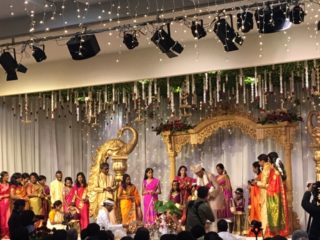 However, unlike Western weddings, the ceremony doesn’t end there. After further blessings by the Priest, both sets of parents bless the couple as well. Showering them with rice grains and flower petals, this signifies prosperity throughout their lives together. When both mother’s ended the ceremony with the ‘aarathi’, I had tears in my eyes. This is the final ritual when both mothers get to bless their children and close the ceremony. The protracted, heartfelt hugs between each mother and her child said it all.
However, unlike Western weddings, the ceremony doesn’t end there. After further blessings by the Priest, both sets of parents bless the couple as well. Showering them with rice grains and flower petals, this signifies prosperity throughout their lives together. When both mother’s ended the ceremony with the ‘aarathi’, I had tears in my eyes. This is the final ritual when both mothers get to bless their children and close the ceremony. The protracted, heartfelt hugs between each mother and her child said it all.
Nearly 3 hours had passed by now. But with the formal ceremony concluding it was time for the feast. Feeding over 500 guests is an enormous task but a necessary part of wedding celebrations. Hot, spicy food is not a woman’s ideal friend in the evening, when already our temperature regulation is out of sync if we aren’t sleeping all night. I wondered how many of the middle-aged and older women in the temple weren’t sleeping all night – because as the women discover on the MyMT™ programmes, if we aren’t sleeping, then our gut health suffers too. The connection between our gut health and sleep is powerful. So not only is the type of food we eat important, but also the timing of this food. Before I did my women’s health research, I had no idea about the powerful connection between timing of food, insomnia and or hormonal changes in menopause. But with menopause insomnia sucking the life out of so many women’s energy levels, then understanding this is so important and it’s why I have this information the MyMT programmesto help women understand how to sleep all night. I know that you already know that without sleep, we cannot function and unbeknownst to many women, it’s the accumulating inflammation from not sleeping that is sending their anxiety, hot flushes and for many, their weight, spiraling too.
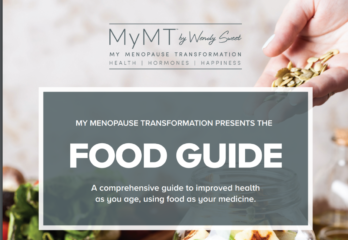 We all love a feast at a wedding don’t we? However, knowing that when we eat too much food, too late at night, impacts hugely on our overnight digestion and can keep us awake with night sweats, it’s important not to eat too much. Being in the second round of guests to dine didn’t quite suit my metabolism nor did the highly, spiced curries, but hubbie was in heaven with the hot curries and what I loved was the selection of hot and cold foods to balance up the food choices which suited me. What I also loved the value and meaning given to food as a part of the important ritual in Hindu celebrations.
We all love a feast at a wedding don’t we? However, knowing that when we eat too much food, too late at night, impacts hugely on our overnight digestion and can keep us awake with night sweats, it’s important not to eat too much. Being in the second round of guests to dine didn’t quite suit my metabolism nor did the highly, spiced curries, but hubbie was in heaven with the hot curries and what I loved was the selection of hot and cold foods to balance up the food choices which suited me. What I also loved the value and meaning given to food as a part of the important ritual in Hindu celebrations.
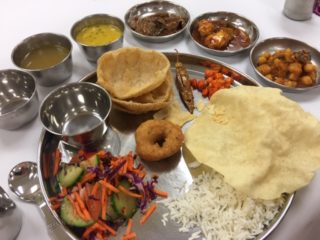 With our busy stressful lives, we’ve kind of lost the mindful ritual of dining over the years haven’t we?
With our busy stressful lives, we’ve kind of lost the mindful ritual of dining over the years haven’t we?
Food shopping, preparation and dining is often rushed or for some families, non-existent. The growth of online shopping and food arriving on your door-step in a box is unprecedented. But what’s in the box matters to our symptoms in menopause. I bet the person designing the food that’s in the box isn’t in menopause so doesn’t understand that not only is our liver health changing, but so too are our gut enzymes, gut motility and because our digestion is affected by whether we sleep or not, what we eat, when we eat and how mindfully we eat, matters.
Women who are exhausted eat and drink emotionally.
True story. I used to as well. As I began to un-tangle the jigsaw of menopause and ‘marry’ this up against evidenced lifestyle solutions (which is what the MyMT programmes teach you), I also began to reflect that the exhaustion I was feeling wasn’t from menopause. This is a natural life event that all women go through (the average age is 52 years) so menopause gets the blame for our exhaustion doesn’t it? But it’s not this at all. As I discovered myself, your exhaustion is from trying to live the life you have been leading for the past 4 decades and not allowing your body to ADJUST to your changing hormonal environment. For me, and for so many women I come across in my live-events and if they come into the programme, some of this exhaustion is from doing too much high-intensity exercise (because the fitness industry has led them to believe that this is the way to lose weight), but exhaustion also arrives when we aren’t absorbing nutrients properly in a liver that is changing as well as not sleeping. But here’s the thing. When we are feeling exhausted, we start to end less mindfully. In fact, there’s a name for this now – emotional eating. Then if women are doing too much exercise and not sleeping and they are in menopause, our brain, muscles and liver are using up a lot of this energy. The cells then deplete stored glucose [called glycogen] more quickly. So you crave sugar and simple carbohydrates such as baked goods, which your brain and muscles are telling you to eat! I see it all the time. It’s partly why so women can’t lose their menopause belly-fat doing all the exercise they are doing – they haven’t got their sleep sorted, nor are they eating the right food for their changing gut, liver, gallbladder and muscles as they transition through menopause.
As we left the reception, we headed back to the temple where the young newly-married couple were waiting for blessings from guests. I loved this. In the weddings I have attended the bride and groom rush off before the night ends. But there they were, seated centre stage surrounded by the various ornaments and oils that have become part of the ancient Hindu wedding celebration. I couldn’t resist taking a photo of the radiant bride with my daughter.
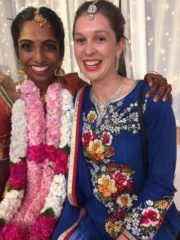 As we drove back to the hotel I reflected on the vibrancy of the wedding embedded in ritual and culture and how this young couple are just beginning the next phase of their life. Our menopause transition is like this too. When I understood that it heralds in a ‘new’ phase of life, our biological ageing’, I also knew that I had to discover why it creates so many problems for so many of us with regard to our energy, enthusiasm and health. Menopause is the opposite life-stage to puberty and if we are going to enjoy and find joy, purpose and meaning as we enter this next life-stage, then we need to understand how to transition through this life-stage so that, like our friend’s daughter and her new husband, we can enter our post-menopause years feeling health, happy and anticipating the future with excitement. If you don’t know how to do this, then please join me in the MyMT programmes – you choose which one will best suit you – Circuit Breaker if you are thinner and leaner and ‘Transform Me’ if you are overweight. They are both online and you work through my information in your private members area over 12 weeks. It doesn’t matter where you live in the world because these programmes are all online. And no matter your culture, we are all connected by our biology at this life-stage. Ragni told me she’s lost weight and feels so much better now too. She so kindly shares her story with you HERE.
As we drove back to the hotel I reflected on the vibrancy of the wedding embedded in ritual and culture and how this young couple are just beginning the next phase of their life. Our menopause transition is like this too. When I understood that it heralds in a ‘new’ phase of life, our biological ageing’, I also knew that I had to discover why it creates so many problems for so many of us with regard to our energy, enthusiasm and health. Menopause is the opposite life-stage to puberty and if we are going to enjoy and find joy, purpose and meaning as we enter this next life-stage, then we need to understand how to transition through this life-stage so that, like our friend’s daughter and her new husband, we can enter our post-menopause years feeling health, happy and anticipating the future with excitement. If you don’t know how to do this, then please join me in the MyMT programmes – you choose which one will best suit you – Circuit Breaker if you are thinner and leaner and ‘Transform Me’ if you are overweight. They are both online and you work through my information in your private members area over 12 weeks. It doesn’t matter where you live in the world because these programmes are all online. And no matter your culture, we are all connected by our biology at this life-stage. Ragni told me she’s lost weight and feels so much better now too. She so kindly shares her story with you HERE.
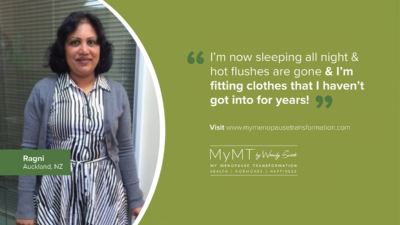
Wendy Sweet, PhD/ Women’s Healthy Ageing Researcher & MyMT Creator & Coach.
Visit the My Menopause Transformation website HERE. Take the Symptoms Quiz and Watch my Introductory Video as well.

